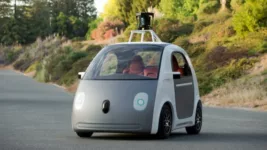There is a lot of hype surrounding self-driving cars, all big players from Google to Mercedes, and even the military, are investing a lot of money and manpower to develop fully autonomous vehicles.
The rapid advance in technology has made it possible to develop self-driving vehicles without having to adapt the infrastructure, removing limitations on their area of application. The main barrier before the vehicles can be introduced to mainstream consumers, is to clarify regulations and liability. Analysts believe user operated autonomous cars will hit the market within the next five years, but it is hard to predict when driverless cars will be available.
The growing popularity of car-sharing companies and the success of Uber show a trend away from using self-owned cars. Some cities are already experimenting with robotic taxis, London’s Heathrow airport has autonomous pods transporting passengers to and from parking lots, and Mercedes is testing driverless trucks.
It is easy to imagine a near future, where you call a car on your smartphone and later see it drive away to the next customer after dropping you off at your destination. This is where Google and Co. see their opportunity: driverless cars will need some kind of operating system to function properly and safely. There will be a need for communication standards or protocols, the initial investment needed to acquire licenses or pass any security tests will be astronomical. Google is way ahead of its competition here, making it a natural choice for first generation driverless cars. The future smartcar could recommend the next best restaurant, use Google Maps to get you there and let you watch Youtube as a kind of onboard entertainment until you reach your destination.
The transition to fully automated transport will be slow, and customer demand will determine the pace. Just as we prefer to buy things online and get them delivered to the doorstep, we will most probably prefer to call a car when and where we want, without the burden of monthly installments, insurance, service, liability and the constant competition with the neighbor on who has the best car.








